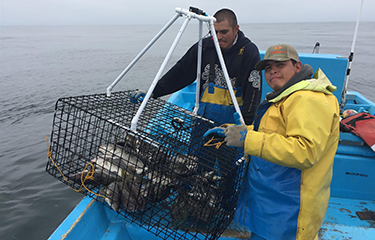As the seafood industry, conservation organizations, and community advocates work together to support healthy fisheries and stable communities, the laboratories for designing new approaches or adapting existing models are small fishing villages throughout the world, like El Rosario, Mexico.
El Rosario is a community of approximately 2,000 people in Baja California, Mexico, that is “dominated by fishing and agriculture,” said Alesa Flores Guzman, a curator with Comunidad y Biodiversidad (COBI), which works to encourage current and future generations of fishers to engage in knowledge-sharing to codesign and implement solutions that establish resilient communities and healthy oceans.
El Rosario has an artisanal fishery targeting five finfish species: ocean whitefish (Caulolatilus princeps), California sheephead (Semicossyphus pulcher), barred sand bass (Paralabrax nebulifer), starry rockfish (Sebastes constellatus), and vermilion rockfish (Sebastes miniatus).
The fishery uses handlines and traps for harvesting, resulting in little ecological impact or bycatch.
The El Rosario Ensenada Cooperative, which has been operating for more than 80 years and includes 84 fishers from 20 commercial vessels in the multispecies fishery, has 150 people employed in its processing plants and holds a concession for lobster, which is the main target species for fishers in the cooperative.
“COBI began working with the Ensenada Cooperative in 2012 to combine efforts in the research and development of marine reserves in their locality,” Guzman told SeafoodSource. “In 2016, the [fishery improvement project] began only for ocean whitefish. To expand the effects of sustainable management, in 2020, it transitioned to a multispecies FIP, including the other four finfish species. The FIP goal is to meet the [Marine Stewardship Council] standard by 2024 and also establish a social work plan working together with all the fishery stakeholders [within] the market, academia, NGOs, and government.”
According to Guzman, the cooperative has done an effective job over its several decades ensuring continuous improvement in El Rosario, like providing services that are critical for building stable, healthy fishing communities, such as medical services.
However, she noted that “there are other basic needs that must be addressed like wastewater treatment and garbage collection, which requires government engagement. The fishing cooperative has approached the government asking for the establishment of services, but there has been little action.”
Therefore, the progress El Rosario and the Ensenada Cooperative have already made, paired with the opportunity to codesign a FIP that would improve the situation further, exemplified the model COBI has set out to establish.
COBI’s El Rosario FIP was a participant in the FisheryProgress “early adopter” program for its Human Rights and Social Responsibility (HRSR) policy released in May 2021. FisheryProgress is a progress-reporting platform that supports transparent and publicly accessible FIP improvement data.
The program offered participating FIPs the opportunity to test drive the policy, which helped FIP implementers design a compliance strategy. The early adopter program also helped FisheryProgress identify opportunities to improve and refine the policy’s implementation.
As COBI worked on the ground with fishers and communities to adapt, create, and tweak solutions, FisheryProgress tracked how the FIP model was driving social change.
“FisheryProgress offered training and coaching to FIP implementers through one-on-one coaching sessions,” FisheryProgress Program Manager Jeremy Rude said. “The HRSR policy requires FIPs to perform a self-evaluation against criteria for increased risk of forced labor and human trafficking, develop a policy statement (code of conduct) and grievance mechanism, help make fishers aware of their rights, and provide a vessel list. The objectives of the policy are to help FIPs identify and reduce the risk of human and labor rights abuses at the harvest stage of their supply chains and to increase transparency around the efforts FIPs and their participants are taking to address human and labor rights risks.”
The Ensenada Cooperative was in a unique position to inform the policy, as it received FairTrade certification before entering the early adopter program.
That familiarity with implementing social policies allowed the finfish FIP to provide feedback on efficient implementation by addressing small but important linguistic and procedural issues in the FisheryProgress policy.
“The 32 FIPs that participated in the early adopter program represented a diverse set of species, geographies, and fishery sizes and provided valuable learning opportunities for other FIPs seeking to meet the HRSR policy,” Rude said. “Out of the 151 active FIPs currently reporting on the site, 100 percent have met the self-evaluation requirement, 73 percent have met the vessel list requirement, and 61 percent have met the grievance mechanism requirement.”
The self-evaluation, vessel list, and grievance mechanism requirements were the first elements of the policy COBI implemented at El Rosario.
The reason the work is so difficult is the same reason it is so important, according to Guzman; lacking robust fishery management and government infrastructure, broader reform is not an option. The work requires fishery-by-fishery interventions, but FIP implementers like Guzman, as well as monitoring groups like FisheryProgress, are building a learning loop to make those interventions easier.
Seafood2030 has sustainability resources translated into Spanish available for companies here.
Photo courtesy of COBI







